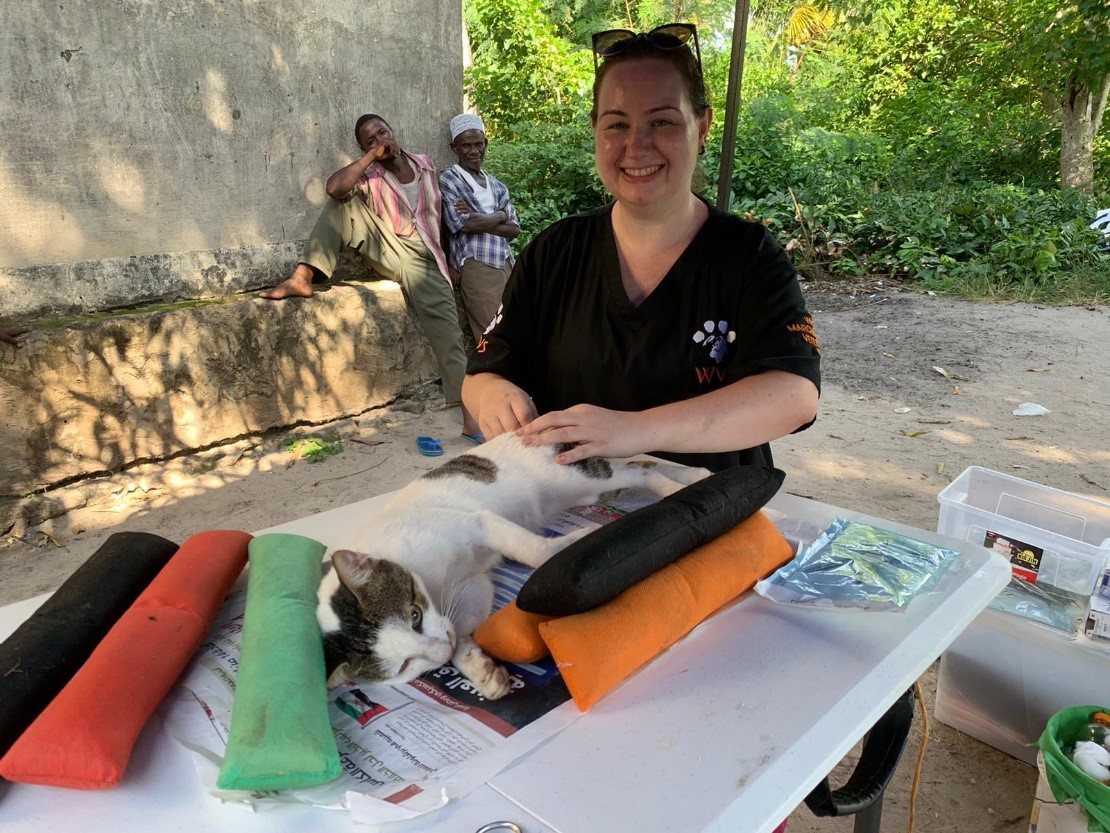Our Vet Nurse Bursary gives qualified and dedicated individuals the chance to work alongside our veterinary teams abroad and provide expert care to animals in need. Earlier this year, bursary recipient Georgina, travelled from the UK to Mafia Island in Tanzania to do just that.
“When I landed in Tanzania for the sterilisation campaign on the 8th March 2020, I had mixed feelings. I was nervous about meeting a new team of people but I was excited to do what I love in a challenging environment. After day one, my nerves had disappeared and I felt inspired by the work we were doing.
“First up was a very in-depth and professional briefing by the Veterinary Project Director, Dr Dagmar. Afterwards, I felt a lot more prepared for what my role was going to be and what we wanted to achieve. I felt very privileged to have won WVS’ Vet Nursing Bursary to take part in this very worthwhile project.
“After the briefing and inventory to check we had all the necessary equipment for the project, I was introduced to the project organiser, Francesca Bensa. While on the island, Francesca made me feel extremely welcome, and I was in awe of how tirelessly she worked to ensure the project went smoothly and was able to benefit as many dogs and cats as possible.
“My second day on the project involved meeting with Mafia Island’s District Commissioner. To me, this highlighted how important our work was, not only for the animals but for the island’s communities. From there, we travelled to our first outreach location in the north of the island and set up a veterinary clinic.

The first veterinary clinic, complete with a roof. “We stayed at the Bweni Beach Camp in a lovely hut set amongst the palm trees and the sand. After a hard day’s work, it was a perfect spot to have a swim and prepare for a well-earned meal cooked by the owner. If you are after modern accommodation with air conditioning and electricity, you won’t find this here. But for me, it was the perfect location to enjoy the full Mafia Island experience.

A Mafia Island sunset from the Bweni Beach Camp – complete with one of the four-legged patients from the day trotting past.
“The next few days involved travelling out to a number of small villages to perform neutering on owned and stray animals who lived there. We would often gain a lot of interest from the local community members who would come along to our clinics with great interest and watch us work.

Members of the community of Mafia Island watching the team at work.

Members of the community of Mafia Island watching a cat being monitored during treatment.
“We travelled from the north to the south of the island, often on very precarious roads which made accessing some locations quite difficult. When we couldn’t access a location with the vehicle, we got out and walked, carrying all the equipment we needed.

The team carrying all our equipment on foot to the next location.
“After a whole week of neutering animals, we had a much-needed day to relax and unwind. We spent the day out on the water, snorkelling off the boat.

The team ready to snorkel off the coast of Mafia Island, Tanzania
“Then, we were back on the road again, setting up outreach projects in small villages to sterilise dogs and cats.
"Sadly, this is when the global COVID-19 pandemic struck. We had to cut the project short and the veterinary volunteers, including myself, had to return home as soon as possible before the borders closed. This was devastating for everyone involved as we all felt we were doing some fantastic work, but we had to prioritise everyone’s safety.
“For anyone considering getting involved in a project, my advice would be to go for it! The work is very hard and at times, when you are covered in dust, sweat and a range of other unsavoury discharges, you wonder why you are there. You need to be confident with quickly drawing up medications and dealing with feral dogs and cats. You need to be prepared to work with what you have in less than ideal locations. Be adaptable; when the clippers run out of charge that’s it, move on to using shaving blades. Most importantly, remember why you are there. Your veterinary knowledge and skills can improve the well-being and quality of life for the animals you are treating, and if you are like me, seeing the animal wake up and wander off happily, makes it all worth it.”
Written by Georgina Winston, Registered Veterinary Nurse from the UK